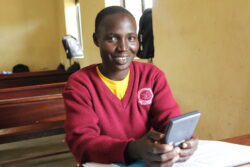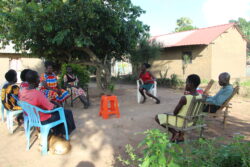“Our School” Radio Programme Inspires Young Mothers to Return to School
December 9, 2022 12:10 pm
“I always had the desire to return to school, but never joined for over 10 years. The desire to return to school grew, even more, when I heard radio programmes about returning to school for young mothers and testimonies of young mothers who’ve returned to school. I felt challenged but also inspired. Now I am back in school and ready to make a better future for myself and my children,” Kiden, a Senior 4 student and mother of four from Yei.
Kiden attends school in Yei River County of Central Equatoria State in South Sudan. Yei River County is located at the border of Uganda and the Democratic Republic of Congo. There are over 40 primary schools and 10 secondary schools currently operational in Yei. The number of schools was much higher before the 2016 crisis. There were 19 secondary schools and over 120 primary schools operating in Yei. The reduction in the number is majorly because people have fled the county due to insecurity leading to displacement of communities to other parts of the country, especially the national capital, Juba and outside of the country.
After spending over 10 years out of school, Kiden was inspired to re-enrol after listening to ‘Our School’ radio programme. After losing both her parents, Kiden took responsibility for her younger siblings with little financial support from her relatives. Faced with financial problems and a decline in her performance in Senior 4, Kiden got married at the age of 20. She was discouraged after failing to obtain the required pass rate in science subjects- her preferred subjects. However, she kept her dream to return to school alive. She said “I got the inspiration when I heard the story of a girl who got married, gave birth, returned to school and is now working. I felt like I could be that girl. So, with support from my husband, I have now enrolled, and I am happy!”

Girls’ Education South Sudan (GESS) produces ‘Our School’ radio programme – a factual 15-minute programme that follows the lives of girls and their families as they strive to resolve the challenges of going to school. These on-air role models act as positive examples, encouraging listeners to adopt behaviours in favour of girls’ education over time. Some episodes on young mothers or early and unintended pregnancies include ‘Enrolment of pregnant and nursing learners’, ‘Effects of early marriage on girls’ education’, and ‘Benefits of an educated woman in a family’. Currently ‘Our School’ is produced in 7 local languages, namely Arabic, Bari, Dinka, Lotuko, Nuer, Shilluk and Toposa, which are widely spoken and aired on 21 radio stations nationwide.
Many girls in South Sudan find themselves in a situation like Kiden. In South Sudan, early and unintended pregnancy leads to a colossal loss of educational opportunities for girls. A high proportion of teenage pregnancies are unintended, and a large majority of adolescent girls who have get pregnant drop out of school.
The Ministry of General Education and Instruction (MoGEI) and GESS conducted nationwide assessment towards the end of 2020, which established that 4,780 learners, out of a total of 1.2 million enrolled girls (0.4%) were pregnant at the time. Out of 2,404 schools that participated in the study, 46.7% identified at least one learner who got married or got pregnant in 2020. https://youtu.be/TUAcvZk5n6c
Early marriage and early and unintended pregnancy are some of the leading causes of school dropout for girls in South Sudan, (Child marriage in South Sudan – Wikipedia ). In a context where most of the population is living below the poverty line, with many struggling to make ends meet day-in and day-out, marrying off a daughter is a sure way for families to acquire resources through a dowry.
Taban Emmanuel, a Head Teacher in Yei also links poverty to early marriage, early pregnancy and, consequently, school dropout. “I have a sister who fell pregnant while in school. My experience shows that girls don’t intend to get married or leave school, but they are forced to do so due to poverty. If a girl lacks things like sanitary pads, and someone is offering them to her, she’ll accept them. That comes with some consequences because some men will then want to marry the girls they support. If not for poverty, girls would stay,”
Through the radio programme and community mobilisation activities of GESS, there have been some changes realised in the attitudes of people towards girls’ education in different communities in South Sudan. “You see, due to continuous reminders to the people through the radio programme and community discussions on the benefits of education, there is a change in the attitude of people towards girls’ education. Now there are girls who have given birth and are in school. This was not common in the past,” Sambala, GESS School Officer, Yei.

Mr Taban, the Head Teacher at a primary school in Yei believes that there is improvement in how people view education, and this could be attributed to the sensitisation of people, as well as the introduction of a government directive that states that all pregnant and nursing learners should have access to education. The directive instructing all stakeholders to allow pregnant and nursing learners to continue learning was issued in 2021 by MoGEI. The circular has been shared and used widely to bring more girls to school. “In the past, if a girl fell pregnant, that would be considered as the end for her to be in school, but now people are changing. There is a girl who fell pregnant, but the family has allowed her to continue attending classes and hasn’t sent her off for marriage”.
Stella, a learner in Senior 2, fell pregnant during the COVID-19-related school closures and is now back in school. She believes that every girl should be able to access education. “I am now back in school. I intend to work hard so that I can become the midwife that I dream to be. I know some parents will not allow their daughters to be in school after getting pregnant but that is not helpful to the girls. Girls can still achieve their life goals even after getting pregnant”.
GESS continues to work with MoGEI at national and state levels to advocate for the right to education for all girls. Despite gains made in girls’ enrolment since the GESS programme began in 2014, there is more work to be done to change negative socio-cultural attitudes towards girls’ education. Change is a process, and, with continuous work, it can be realised!
For more information on GESS’ community mobilisation activities, go to our website: https://girlseducationsouthsudan.org/activity/social-behavioural-change-communication/
Categorised in: Girls' Education, Human Interest Story, Social & Behavioural Change Communication, Uncategorised
Comments are closed here.